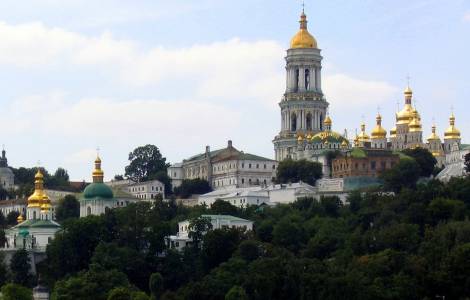
by Chiara Dommarco
Kiev (Fides News Agency) – On Tuesday, August 20, the Verkhovna Rada, the unicameral Parliament of Ukraine, approved, in its second reading, Bill 8371, entitled "On the protection of the constitutional order in the context of the activities of religious organizations", which prohibits the presence of any religious organization affiliated to the Russian Federation on Ukranian territory, with explicit reference to the Ukrainian Orthodox Church (UOC MP – Ukrainian Orthodox Church of the Moscow Patriarchate, hereinafter UOC). The law was adopted with 265 votes in favour, 29 against, 4 abstentions and 24 non-voting.
The text of the law, which on August 16 had obtained the approval of the Committee for Humanitarian and Information Policy (Komitet z pitan ’gumanitaroï ta ìnformacíjnoï politiki), first defines what the law itself means by "foreign religious organization", that is, an organization "constituted and/or registered as a legal entity in accordance with the legislation of another State, located outside Ukraine" (article 2, paragraph 1).
Subsequently, the law identifies two criteria which, if met at the same time ("odnočasno") by a foreign religious organization, prohibit its existence in Ukrainian territory: 1) it is based in a State "recognized as having carried out or that is carrying out an armed aggression against Ukraine and/or temporarily occupying part of Ukrainian territory"; 2) "supports directly or indirectly (also through public speeches made by – its, ed. - leaders or others – its, ed – governing bodies) an armed aggression against Ukraine" (article 2, paragraph 2). Article 3 defines the UOC as an "ideological prolongation of the regime of the aggressor state, complicit in war crimes and crimes against humanity perpetrated in the name of the Russian Federation and the ideology of the ‘Russian world’", explicitly prohibiting its existence on Ukrainian territory. Likewise, religious organizations affiliated with foreign religious organizations declared illegal by the law in question and/or religious organizations not in compliance with the provisions of article 5 of the 1991 "On freedom of conscience and religious organizations" law (article 3, paragraph 3) are prohibited. It should be noted that Article 5 of the aforementioned law provides for the separation of the Church and religious organizations from the State, from which the legislator derives the obligation of non-interference of these in the activity of political parties and, conversely, of the State's non-interference in the "legitimate activities" of religious organizations. According to the provisions of the newly approved law, real estate and capital owned by the prohibited religious organization will be forfeited to the State, with the exception of goods for liturgical use (Second section, paragraph 2.2.b).
The law will enter into force 30 days after publication, with the exception of the legal proceedings to be implemented against UOC communities, for which it establishes engorcement as of nine months from the date of publication.
Bill 8371 was adopted at first reading on October 19 2023, with a majority of 267 votes (and 15 against). On July 23, 2024, a group of deputies had occupied the Rada after learning that the Bill had not been placed on the last agenda to be discussed and voted on by the Ukrainian Parliament itself. Among the main promoters of Bill 8371, Petro Poroshenko, former president of Ukraine between 2014 and 2019, and current secretary of the European Solidarity Party (Jevropejs'ka Solidarnist’).
On February 24, 2022, near the outbreak of the conflict, Metropolitan Onufriy (Berezovskij), head of the UOC, had publicly declared to be against the military operations undertaken by Moscow. The UOC is not to be confused with the Orthodox Church of Ukraine (OCU − Orthodox Church of Ukraine), led by Metropolitan Epiphany (Dumenko), who in January 2019 had obtained the tomos of autocephaly from the Ecumenical Patriarch of Constantinople, completing the split from the Moscow Patriarchate. (Fides News Agency 21/8/2024)